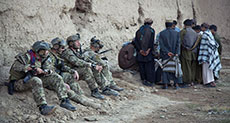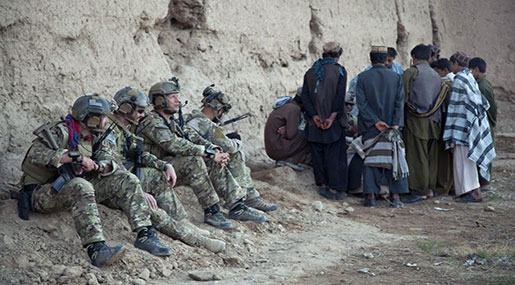
Trump’s Yemen Policy Serves Saudi Royals Better Than Americans

Conor Friedersdorf
How many highway lanes could be paved, how many bridges repaired, how many illnesses averted, how many opiate addicts saved from overdoses, how many veterans given better care with the hundreds of millions of dollars that the Trump administration is spending on discretionary military operations in impoverished Yemen?

The United States is allied with Saudi Arabia as it prosecutes a brutal military campaign there. "The US role in the war is substantial," Michael Brendan Dougherty explains.
"Saudi Arabia buys most of its weapons from the US. Its pilots are trained by the United States. And the United States refuels Saudi planes in the air. The US military is widely believed to be helping the Saudis choose targets. And US special [operations] forces are on the ground in Yemen, ostensibly to fight local al-Qaeda outfits."
Dougherty adds:
But just as in Syria, the US finds itself committed to the downfall of a Shia government, while at the same time working to degrade the ability of al-Qaeda to benefit from the fall of that same government. The Saudi coalition routinely bomb civilian targets like hospitals or food production facilities...
It's just the sort of messy intervention that an establishment hawk like Hillary Clinton would've hubristically prosecuted and that populists are understandably tired of financing.
Still, Trump persists in deepening American involvement.
"Already, President Trump has granted a Pentagon request to declare parts of three provinces of Yemen to be an ‘area of active hostilities' where looser battlefield rules apply," The New York Times reports. Weeks ago, Trump approved a raid that left a Navy SEAL and multiple innocent children dead while costing tens of millions of taxpayer dollars and failing to kill or capture any senior terrorists. The father of the fallen Navy SEAL has angrily demanded an investigation.
The White House bafflingly described the outcome as a success, as if it did not adequately value the lives of Navy SEALs or innocent Yemeni children or taxpayer dollars. Did the raid signal that Trump will put more American boots on the ground in Yemen? Defense One has reports of a spike in drone strikes and more ground troops.
"This is a major new development in a military intervention launched by the Obama White House without public discussion or a declaration of war," Bonnie Kristian argues at Business Insider. "Obama started US involvement in Yemen secretly and illegally, and to escalate to ground war-to putting US troops in harm's way-without so much as a go-ahead from Congress would be a serious mistake."
What she means by describing the war as illegal is that, in her estimation, it falls outside the bounds of the Authorization for Use of Military Force that Congress passed right after 9/11. Rep. Barbara Lee cast the lone vote in opposition, presciently fearing that its broad language could be used to justify military actions far beyond anything that the legislators who lined up behind the measure were contemplating.
The Obama administration repeatedly stretched its language past the breaking point. Hillary Clinton, too, advocated using it to launch military interventions, like the one in Libya, without obtaining Congressional permission as the Framers intended.
Now almost 16 years have passed since the AUMF was made law.
Trump, who pledged to defeat Daesh [ISIS/ISIL] but otherwise led voters to believe that he would stop spilling blood and treasure abroad, is escalating US involvement in a civil war. He is expected to sign off on "a similar Pentagon proposal to designate parts of Somalia to be another such battlefield-style zone for 180 days," the Times reports. And the Army Times reports that the US military "is sending an additional 2,500 ground combat troops to a staging base in Kuwait from which they could be called upon to back up coalition forces battling Daesh in Iraq and Syria."
A few members of the legislature are alarmed.
"The power to make war is explicitly granted to Congress in Article I Section 8 of the Constitution," says Rep. Jim Himes, a Democrat, who is cosponsoring a bill to rein in the executive branch. "Over many decades, however, this power has migrated increasingly to the President. We are now in a situation where military actions are carried out by the US around the world without the explicit approval of Congress."
For the most part, however, his congressional colleagues are happy to abrogate their duty, rendering the public less able to hold them accountable for whatever position they'd take--thus undermining a core aspect of representative government.
If left unchecked, Trump's approach in Yemen risks deepening a famine that puts millions at risk of starving in the short term and stoking a backlash against America in the long term. Already, Trump is allocating resources in ways that do nothing to benefit most Americans. Through policy that serves Saudi princes better than red-state voters, he is making the military-industrial complex great again.
Source: The Atlantic, Edited by website team
Comments



